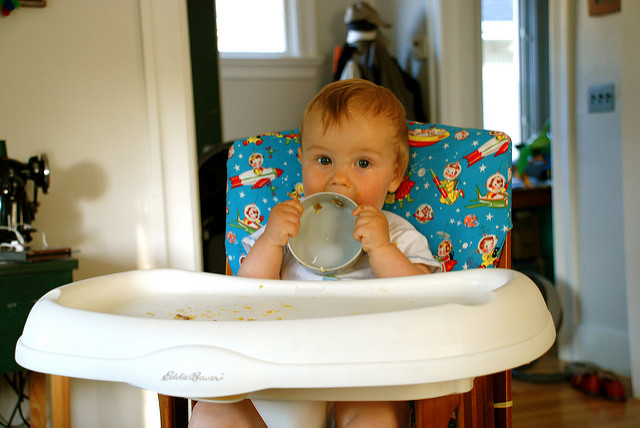
Milk, Meat, and Introducing Solids
By Mary Moerbe
You don’t have to be a parent to know that life gradually gives you more to chew on and understand. Each one of us learned, “The sky is blue” before we learned how and why that happens — if we learned — and religious life and education is in some ways comparable: there is milk and there is meat.
St. Peter is clear: “Like newborn infants, long for the pure spiritual milk, that by it you may grow up into salvation—if indeed you have tasted that the Lord is good” (1 Peter 2:2-3). Taste! Drink! Grow by the goodness of our God!
Long for pure spiritual milk. Wake up and cry out for it. Don’t look inside yourself, because this is good stuff that is external to you. It is something that can only be given or received, rather than created or conjured within.
Still, there is more than the initial stage of life, born or reborn. It isn’t that things change: Jesus Christ is the same yesterday, today, and forever (Hebrews 13:8), but, when you hunger, turn again to the Word and the Bread of Life.
We follow Christ, our Leader, and it happens that He has much to teach us. Did you know education comes from a Latin term meaning “led out”? Our Lord leads us out of death into life, darkness into light, rebellion into trust, and, God-willing, ignorance into understanding.
St. Paul says, “I fed you with milk, not solid food, for you were not ready for it. And even now you are not yet ready” (1 Corinthians 3:2). In a previous post, I mentioned maybe it is understandable when people react as though drowning when they are suddenly thrown into a study they are not ready for. It is a real spiritual condition.
My fear, however, is that too many are in a self-perpetuating cycle. Clinging to milk — or nothing at all — can the born-again, born-from-above longing slip away? Could the spiritual stomach distend so that digestion is affected and then the rest of the body? Is this another occasion to consider the implications of taste and preference? Could self-induced speculation or distraction affect the gifts God gives even in His powerful, saving Word?
Quick! Bylaws to regulate Lutheran lunchrooms and chapels! Just kidding. Before we count spiritual calories or otherwise get ahead of ourselves, let’s remember what it is to taste the goodness of God.
God comes to us. His gifts radiate with intentions that exceed our own. The consequences are in His hands, though we do well to trust and obey Him.
Certainly, the means of grace are not something to trifle with. At the same time, don’t the above passages demonstrate that this is a human condition rather than a cultural crisis?
We live in a time of perhaps unprecedented confusion over the Word and the Faith as nonbelievers cry out, “That isn’t Christian!” and “That isn’t what Jesus would do!” Part of this is surely a cultural Christianity unmoored.
As that pro-church culture sails away, it leaves behind more than a few bewildered workers. So what can we do to help the newborn Christian, younger or older, keep things clear and perfectly in line?
Two things strike me. First, isn’t there a large role for conversation in just about every vocation? People need to talk to each other. They need each other, to sharpen and to console, to earn and to eat their daily bread. Second, a little like Law and Gospel, all of us need milk or meat at varying moments, and isn’t that fluctuation of our spiritual condition and need toward the heart of why catechesis is lifelong?
It may or may not surprise you to learn that introducing solids to actual infants has included major shifts in philosophy and even theology. Obviously parents have to choose their own course, but despite various human goals and many weaknesses and failings, God very regularly raises babies into adults.
Cry out for that for pure spiritual milk for yourself and others. Again and again, taste and see that the Lord is good. Then, take, eat. That is what has to happen before we can take that morsel and pass it on to our friends, family, congregations, and the stranger we found crumpled in tears in the parking lot.
Solids have to be introduced intentionally before a child of God can actually eat it. So, let’s practice honest conversation. Let’s talk sin and our need for our specific Savior. (Or write—I love it when people write.) Let’s gradually but intentionally introduce the substance of Christ and His teaching right now. To everyone, confirmed or not.
Think about what you really want your loved ones to know—and yourself to remember. They are already sinning and being sinned against. They already face the troubles of this world. Then, expand upon it. Now is the time to consider what he or she is ready for. Next comes the opportunity to speak it and, God-willing, mutual growth as we follow our Savior.
Mary J Moerbe is an LCMS deaconess and author with a new blog dedicated to encouraging Lutherans to write. Her next book, Blessed, will be available through CPH in June.
Photo Credit to Peter Merholz. Some rights reserved.




